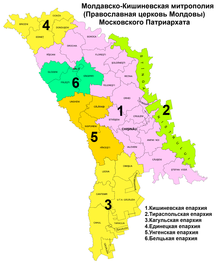Metropolis of Chișinău and All Moldova
Metropolis of Chișinău and All Moldova | |
|---|---|
Metropolitan Vladimir | |
| Website | |
| www.mitropolia.md |
The Metropolis of Chișinău and All Moldova (
The Metropolis of Chișinău and All Moldova is the largest church in the country, and one of the two main Orthodox churches in Moldova (beside the Metropolis of Bessarabia, an autonomous metropolitanate of the Romanian Orthodox Church). In the 2004 census in Moldova 3,158,015 people or 95.5% of those declaring a religion claimed to be Eastern Orthodox Christians of all rites.
The head of the Moldovan Orthodox Church is Metropolitan
History

It is believed that Orthodox Christianity was first brought to
In 1812, the eastern half of Moldavia (renamed as Bessarabia) was annexed by the Russian Empire, which placed the Orthodox churches in this territory under the jurisdiction of the Russian Orthodox Church. In 1813, it was established the Eparchy of Kishinev (Chișinău) and Hotin, under Romanian Archbishop Gavril Bănulescu-Bodoni. After 1821, the Russian state and church started a policy of centralization and Russification that included the imposition of Church Slavonic instead of Romanian as the liturgical language, and all archbishops as Russians.[2][3] However, native priests continue to serve in the rural parishes (covering most of the Moldavian population); as most did not speak Russian, attempts to establish a Russian-only seminary failed, and the rural clergy became increasingly isolated from the church leadership. Consequently, after 1867, church authorities began using both Romanian and Russian in their publications, and in 1905 there was a short-lived initiative to make Romanian the language of education.[4]
In 1858, after southern Bessarabia was
In 1918, after the region came under Romanian rule, the Archdiocese of Kishinev came, against protests of the Russian Orthodox Church, under the subordination of the Romanian Orthodox Church. Unwilling to accept the changes that came, its bishop was replaced.[6][7] In 1922, the Holy Synod of the Romanian Orthodox Church set up two more dioceses in Bessarabia—the Diocese of Hotin, seated in Bălți, and the Diocese of the Cetatea Albă, seated in Ismail—and, in 1927, the Orthodox Church in Bessarabia was raised to the rank of the Metropolis of Bessarabia. The Romanian state and church started a counter-campaign of Romanianization in order to impose Romanian as the liturgical language, and the Revised Julian calendar usage.[2]
Following the
A year after independence from the USSR as the Republic of Moldova in 1991, the Russian Orthodox Church granted autonomy to its jurisdiction in the new country and raised the rank of the Archdiocese to the Metropolis of Chișinău and All Moldova.[9][10]
Structure and organization
The Moldovan Orthodox Church claims exclusive jurisdiction over the Orthodox Church in Moldova, although this is contested by the Romanian Orthodox Church and its Metropolis of Bessarabia. The Metropolis of Chișinău and All Moldova currently consists of five
Since the grant of autonomy to the Moldovan Orthodox Church by the Moscow Patriarchate, the Church has administered its local affairs through a local synod chaired by its primate, and the Church's eparchial or diocesan bishops.
The position of the Romanian Orthodox Church
The Romanian Orthodox Church consider that, during the time, the Russian Orthodox Church jurisdiction on the former territory of Bessarabia was an unfair and abusive act in terms of historical reality and canon law, and the jurisdiction right of the Russian Metropolis of Chișinău and All Moldova can be exercised only to the Russian ethnics of Moldova.[11]
In the lead-up to the independence of Moldova, the Romanian Orthodox Church reactivated the interwar
The Metropolis of Bessarabia had 84 parishes in Moldova at the time of its organization, and is considered a
See also
- History of the Orthodox Church in Moldova
- Metropolis of Moldavia and Bukovina
- Archbishop of Chișinău
- Religion in Moldova
- Metropolis of Bessarabia
References
- ^ Православная Церковь Молдовы (Biserica Ortodoxă din Moldova) (in Russian)
- ^ ISBN 978-1-4443-9254-8.
- ^ a b Viaţa bisericească din Basarabia sub stăpânirea rusească (1812-1918) (in Romanian)
- ISBN 978-0-19-822126-5.
- ^ The Lower Danube Archidiocese history
- ^ a b c d The Position of the Romanian Patriarchate concerning the Reactivation of the Three Dioceses in the Metropolitanate of Bessarabia
- ^ Biserica Ortodoxă Română din Basarabia în perioada 1812-1918
- ^ Contextul istoric at mitropoliabasarabiei.ro (in Romanian)
- ^ Istoric at mitropolia.md (in Romanian)
- ^ "Moldova's Orthodox churches quietly divided". Religion Watch. Vol. 34, no. 3. Waco, TX: Baylor ISR. 2019.
- ^ 19 mai 1993 - Scrisoarea Prea Fericitului Patriarh Teoctist către Sanctitatea Sa Alexei II (1993) (in Romanian)

